May 19, 2024 | 11:05 GMT +7
May 19, 2024 | 11:05 GMT +7
Hotline: 0913.378.918
May 19, 2024 | 11:05 GMT +7
Hotline: 0913.378.918
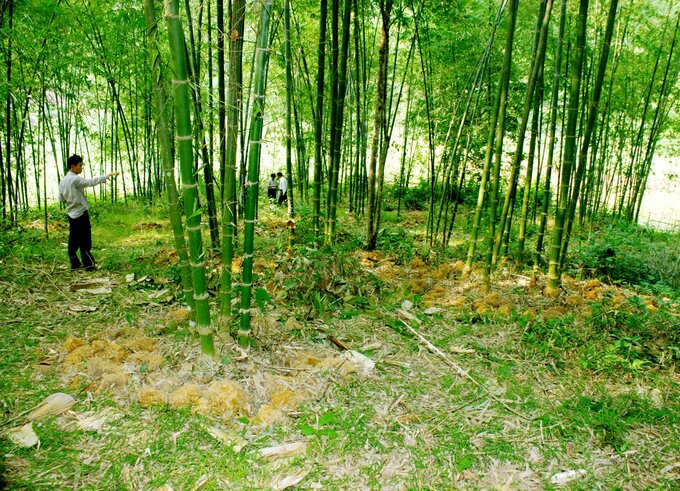
Bamboo varieties in Thanh Hoa are being invested by projects to recover and develop.
The project “Sustainable and comprehensive development of the clam and bamboo value chain in Vietnam” is co-operated by the Research Center for Non-timber Forest Products Academy of Forest Science) with the European Union and partners such as Oxfam, ICAFIS, NTFPRC and VCCI. The project is implemented in Nghe An, Thanh Hoa (bamboo) and Tien Giang, Tra Vinh, Ben Tre (clams) for 5 years, from 2018 - 2023.
With the motto “From Sustainability to Prosperity”, the project wants to contribute to reducing poverty and inequality in rural areas of Vietnam through the development of sustainable and inclusive value chains. Its first goal is to increase the income of small and medium-sized clam/bamboo producers and producers thanks to sustainable production practices, efficient business and improved market access capability. The next goal aims to make the clam/bamboo value chain in the five provinces of Thanh Hoa, Nghe An, Tra Vinh, Ben Tre, Tien Giang better organized, more equitable and benefit low-income people.
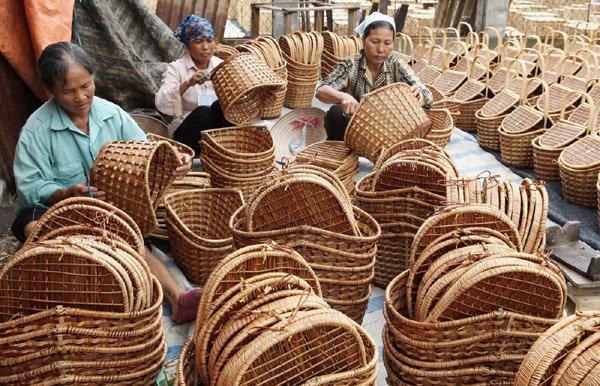
One of the measures for sustainable development of the bamboo industry is to promote collective activities.
Over 12,000 small-scale farmers in the bamboo chain have been improved in terms of their ability to apply appropriate production techniques and implement FSC sustainability standards. There are two FSC certificates for bamboo issued to the household groups in Thanh Hoa and Nghe An. In which the first FSC certificate is for an area of 2,400 ha for Dendrocalamus barbatus (luong bambo) of 545 households in Thanh Xuan, Phu Xuan, Phu Son, and Phu Le (Quan Hoa district, Thanh Hoa). And the second FSC certificate is for the 938 ha of Bambusa longgissia (lung bamboo) for a group of 212 households in Dong Van and Thong Thu (Que Phong district, Nghe An province).
The project “Sustainable and comprehensive development of the clam and bamboo value chain in Vietnam” also promotes collective activities in production and business. This will help improve the business efficiency of small-scale producers and cooperatives through comprehensive operations.
Regarding this matter, 60 small-scale production groups in Thanh Hoa and Nghe An have been established. In addition, 540 leaders and key members of the smallholder farmer group have received training and strengthened their capacity to manage and operate the group.
There are 6 core groups in the 60 mentioned groups: 3 are in Sai village of Phu Le commune, On village of Phu Son commune (Quan Hoa district) and Ngam village of Son Dien commune, Quan Son district (Thanh Hoa). They operate in the form of handicraft knitting groups with support from Eco Bamboo company. The remaining 3 groups were in Ang Du village of Thong Thu commune, Pu Khoong village of Dong Van commune, Que Phong district (Nghe An) and Xet 2 village of Chau Thang commune, Que Phong district (Nghe An).

Many businesses have invested in making diverse and aesthetic rattan products for export.
In 2021 these preliminary processing groups bought bamboo materials for small-scale producers in the region at a price of approximately 40% higher than the normal material price the region used to sell to traders. This also drove up the selling price of bamboo materials in the region to experience an increase by an average of 20-30% compared to previous years.
Thanks to the source of quality materials from the FSC-certified restoration model and effective leadership and management of local authorities, preliminary processing models in Quan Hoa consumed more than 30 tons of raw materials/day/model, creating stable jobs for more than 50 direct employees from the groups and achieving a growth rate of more than 300% in 2021. The average income of each employee was VND 5-7 million/month.
Meanwhile, the model of the raw material processing group in Ngam village (Quan Son district) attracted more than 20 direct workers and about 30 indirect workers from households and consumed more than 10 tons of raw materials every day. The average income per direct worker was from VND 5 to 6 million/month.
Up to now, the project “Sustainable and comprehensive development of the clam and bamboo value chain in Vietnam” has successfully tested 11 pilot models, including 2 luong bamboo forest restoration model in Quan Hoa; 4 Bambusa nutans (vau bamboo) and lung bamboo forest restoration models at Quan Son (1), Que Phong (2) and Quy Chau (1); 2 bamboo preliminary processing models in Quan Hoa; 1 seed production model, 1 of lung bamboo intensive cultivation model and 1 bamboo processing model in Quan Son.
To achieve such a feat, the project has supported businesses, people and cooperatives to increase access to both domestic and international markets while promoting public-private partnerships to provide support in terms of policy and governance.
Translated by Samuel Pham
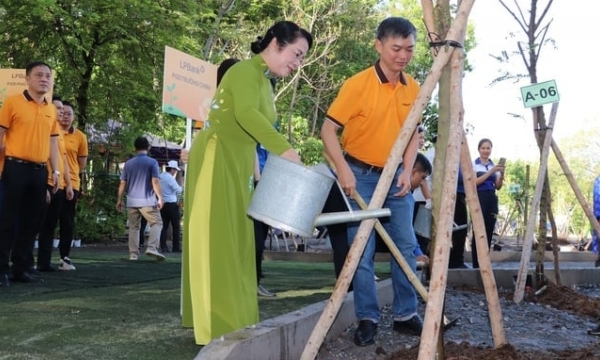
(VAN) Planting and expanding green spaces is a crucial effort to mitigate and adapt to the impacts of climate change, thereby creating a clean and livable environment.
/2024/05/17/5720-1-134847_782.jpg)
(VAN) EcoTraceTech - System for measuring CO2 and CH4 emissions from rice plants is the startup idea of a group of Can Tho University students.
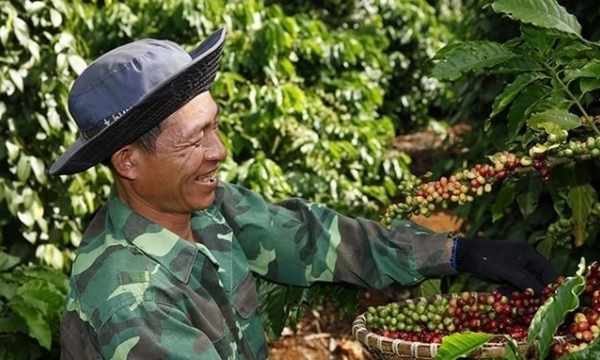
(VAN) The NESCAFÉ Plan by Nestlé Vietnam in the Central Highlands together with MARD aims to support coffee farmers in regenerative agriculture.
/2024/05/16/4437-1-223910_491.jpg)
(VAN) The Community Food Garden model is one of the outstanding activities and models of green transformation in the world as well as in Vietnam.
/2024/05/16/2455-1-111202_165.jpg)
(VAN) Artemia eggs originating in Vinh Chau (Bac Lieu) are assessed by customers to have the best quality in the world; however, domestic production output only accounts for 1%.
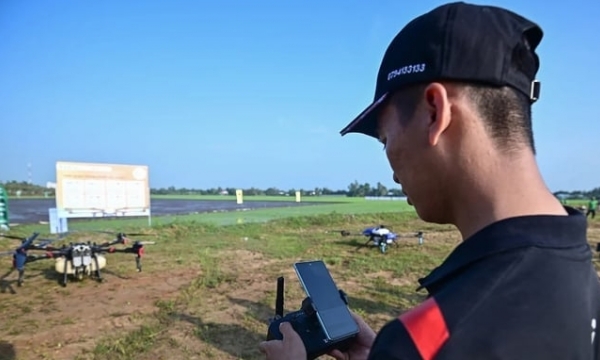
(VAN) Deputy Permanent Chairman of the National Committee for Digital Transformation Tran Luu Quang chaired the symposium on 'Promoting digital transformation of agriculture,' held on May 14.
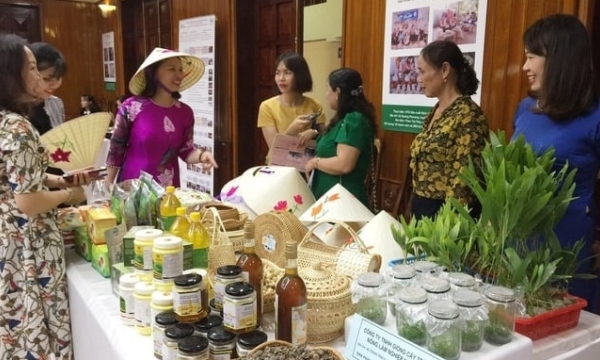
(VAN) After seven years of implementation, the Commercial Smallholder Support Project (CSSP) successfully aided numerous local households in escaping poverty, with multiple infrastructure projects initiated across Bac Kan province.